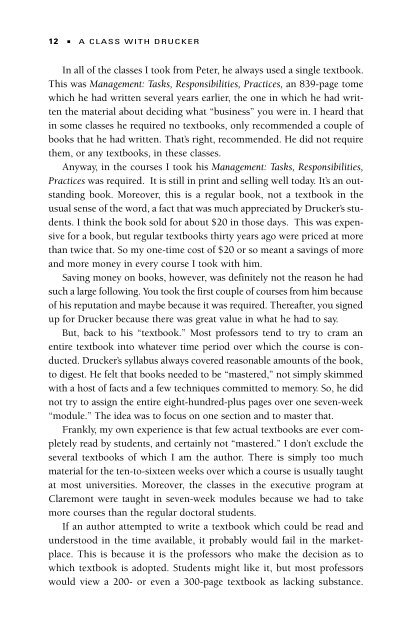A Class with Drucker - Headway | Work on yourself
A Class with Drucker - Headway | Work on yourself
A Class with Drucker - Headway | Work on yourself
Create successful ePaper yourself
Turn your PDF publications into a flip-book with our unique Google optimized e-Paper software.
12 ■ A CLASS WITH DRUCKER<br />
In all of the classes I took from Peter, he always used a single textbook.<br />
This was Management: Tasks, Resp<strong>on</strong>sibilities, Practices, an 839-page tome<br />
which he had written several years earlier, the <strong>on</strong>e in which he had written<br />
the material about deciding what “business” you were in. I heard that<br />
in some classes he required no textbooks, <strong>on</strong>ly recommended a couple of<br />
books that he had written. That’s right, recommended. He did not require<br />
them, or any textbooks, in these classes.<br />
Anyway, in the courses I took his Management: Tasks, Resp<strong>on</strong>sibilities,<br />
Practices was required. It is still in print and selling well today. It’s an outstanding<br />
book. Moreover, this is a regular book, not a textbook in the<br />
usual sense of the word, a fact that was much appreciated by <str<strong>on</strong>g>Drucker</str<strong>on</strong>g>’s students.<br />
I think the book sold for about $20 in those days. This was expensive<br />
for a book, but regular textbooks thirty years ago were priced at more<br />
than twice that. So my <strong>on</strong>e-time cost of $20 or so meant a savings of more<br />
and more m<strong>on</strong>ey in every course I took <str<strong>on</strong>g>with</str<strong>on</strong>g> him.<br />
Saving m<strong>on</strong>ey <strong>on</strong> books, however, was definitely not the reas<strong>on</strong> he had<br />
such a large following. You took the first couple of courses from him because<br />
of his reputati<strong>on</strong> and maybe because it was required. Thereafter, you signed<br />
up for <str<strong>on</strong>g>Drucker</str<strong>on</strong>g> because there was great value in what he had to say.<br />
But, back to his “textbook.” Most professors tend to try to cram an<br />
entire textbook into whatever time period over which the course is c<strong>on</strong>ducted.<br />
<str<strong>on</strong>g>Drucker</str<strong>on</strong>g>’s syllabus always covered reas<strong>on</strong>able amounts of the book,<br />
to digest. He felt that books needed to be “mastered,” not simply skimmed<br />
<str<strong>on</strong>g>with</str<strong>on</strong>g> a host of facts and a few techniques committed to memory. So, he did<br />
not try to assign the entire eight-hundred-plus pages over <strong>on</strong>e seven-week<br />
“module.” The idea was to focus <strong>on</strong> <strong>on</strong>e secti<strong>on</strong> and to master that.<br />
Frankly, my own experience is that few actual textbooks are ever completely<br />
read by students, and certainly not “mastered.” I d<strong>on</strong>’t exclude the<br />
several textbooks of which I am the author. There is simply too much<br />
material for the ten-to-sixteen weeks over which a course is usually taught<br />
at most universities. Moreover, the classes in the executive program at<br />
Clarem<strong>on</strong>t were taught in seven-week modules because we had to take<br />
more courses than the regular doctoral students.<br />
If an author attempted to write a textbook which could be read and<br />
understood in the time available, it probably would fail in the marketplace.<br />
This is because it is the professors who make the decisi<strong>on</strong> as to<br />
which textbook is adopted. Students might like it, but most professors<br />
would view a 200- or even a 300-page textbook as lacking substance.


